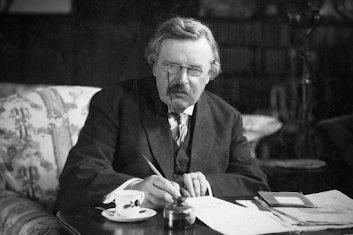Over the years I've been fortunate to have a number of my clerihews published in Gilbert . The current tally is 50 individual poems. Due to some mix-up, four of those were published a second time.
The last one published was a Robert Burns one in the May/June 2022 issue.
Although I did not attend the Conference last year, I did submit several clerihews for the Clerihew Contest. Alas, they did not make the winners' list, nor have they appeared since in any issue. So unless one of those that I submitted last July make it into print in the future, the tally will likely remain at 50.
Not a bad total.
Oh, I'm still writing clerihews, and will continue to post them here, but I've stopped submitting to the magazine for now.
Here's the published list in alphabetical order:
Achilles - Gilbert Nov/Dec 2017
After that day in Moriah, young Isaac - Gilbert Nov/Dec 2017
Albert Einstein - Gilbert Magazine, September 2009Alexa - Gilbert May/June 2020
Anne Rice - Gilbert Magazine, March/April 2011
As a director, Ed Wood - Gilbert May/June 2020
A somber Marquis de Sade - Gilbert May/June 2017
At Nicaea, St. Nicholas - Gilbert! May/June 2019
Ayn Rand - Gilbert May/June 2020
Charles Bukowski - Gilbert January/February 2017
Condoleeza Rice - Gilbert Magazine, June/July 2007
Dr. Mary Gatter - Gilbert May/June 2017
e (cummings) e - Gilbert Magazine, March/April 2011
Elizabeth Warren - Gilbert May/June 2020
Evangelista Torricelli - Gilbert January/February 2019
Fidel Castro - Gilbert Magazine, April/May 2007
Fred Rogers - Gilbert November/December 2018
Geoffrey Chaucer - Gilbert May/June 2020
G. K. Chesterton - Gilbert Nov/Dec 2017
Herman Melville - Gilbert Magazine, April/May 2007
I don’t know if Rudyard Kipling - Gilbert Magazine, April/May 2007
In his early life Thomas Merton - Gilbert Magazine, March/April 2011
In those woods, Robert Frost- Gilbert Magazine, April/May 2009
Irascible St. Jerome - Gilbert Nov/Dec 2017
Jackson Pollock - Gilbert! May/June 2019
Jean Paul Sartre - Gilbert Magazine, April/May 2007
Lot's wife - Gilbert Magazine, March/April 2011
Methuselah - Gilbert! July/August 2018
Napoleon Bonaparte - Gilbert Nov/Dec 2017
One of the aims of ISIS - Gilbert May/June 2017
One of the aims of ISIS - Gilbert May/June 2020
Paolo Uccello - Gilbert November/December 2018
President James Polk - Gilbert Magazine, May/June 2011
Prolific Stephen King - Gilbert Magazine, March/April 2011
Robert Burns – Gilbert May/June 2022
Rudyard Kipling - Gilbert April/May 2007
Saintly King Henry - Gilbert November/December 2018
Steven Wright - Gilbert May/June 2017
Steven Wright - Gilbert! May/June 2019
St. Dominic - Gilbert November/December 2018
St. Francis of Assisi - Gilbert Magazine, April/May 2007
St. Thomas Aquinas - Gilbert November/December 2018
There was a side of J. R. R. Tolkien - Gilbert Nov/Dec 2017
Titus Oates - Gilbert! May/June 2019
Tron - Gilbert November/December 2018
TV’s Dr. House - Gilbert Magazine, April/May 2007
Vladimir Kosma Zworykin - Gilbert Magazine, March/April 2011
Vladimir Putin - Gilbert (March/April) 2017
When Alexander Pope - Gilbert May/June 2017
When Alexander Pope - Gilbert! May/June 2019
When he was young St. Polycarp - Gilbert May/June 2017
When he was young St. Polycarp - Gilbert! May/June 2019
When talking with Socrates - Gilbert Magazine, January/February 2007
When Siddhartha Gautama - Gilbert Magazine, July/August 2009
Yvonne De Carlo - Gilbert! March/April 2021

















